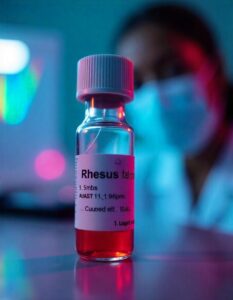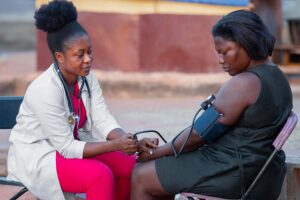Every drop of blood carries a hidden story. Your rhesus factor is more than just a medical term—it’s a lifeline. In Nigeria, countless lives depend on blood compatibility, yet many remain unaware of how critical their blood group is to survival. This knowledge could be the difference between life and death.
What is the Rhesus Factor?
The rhesus factor (Rh) is a protein found on red blood cells. You are either Rh-positive or Rh-negative. While O positive is the most common type, Rh-negative is rare, making blood donation crucial for those with this blood type.
A mismatch in Rh factors during pregnancy or transfusion can lead to life-threatening complications. If an Rh-negative mother carries an Rh-positive baby, her immune system may attack the fetus’s blood, causing severe anemia or stillbirth. Blood plasma donation and compatible donors are vital to preventing such tragedies.
Why Knowing Your Rhesus Factor is Crucial
Understanding your rhesus factor helps in emergencies, blood donation, and pregnancy care. Hospitals and plasma donation centers struggle to find matching donors, especially for Rh-negative patients. By donating, you bridge this gap and save lives.
Oneus in Nigeria provides a reliable blood donation website to educate and connect donors with those in need. They offer a seamless donation process, ensuring a safe and efficient way to give blood.


The Impact of Blood Donation in Nigeria
Nigeria faces an acute blood bank shortage. Many die from conditions that could be treated with a simple blood drive. Platelet donation helps cancer patients, and stem cell donation offers hope to those with blood disorders.
By donating at a certified plasma center, you contribute to national health security. Many fear selling plasma, but ethical plasma donation centers ensure safety. Rather than searching for places to donate plasma, trust reputable organizations like Oneus in Nigeria.
Blood Donation Benefits You Too!
Donating blood isn’t just about saving lives; it benefits the donor too.
- Improves heart health: Lowers iron levels, reducing heart disease risks.
- Boosts skin health: Blood donation benefits to the skin include better circulation and detoxification.
- Stimulates new cell production: Encourages the body to regenerate fresh blood cells.
- Reduces cancer risks: Studies show regular donors have lower chances of developing cancer.
Risks of Not Donating Blood
Nigeria’s blood shortage leads to:
- Higher maternal mortality rates: Pregnant women often need transfusions.
- Increased child deaths: Newborns require umbilical cord blood banking for survival.
- Delayed emergency response: Accident victims need instant transfusions.
Without enough blood plasma donation, sickle cell patients and those undergoing surgeries face grave danger. Private cord blood banking helps but is costly, making public donations more essential.
How to Donate Blood and Save a Life
- Find a reliable blood donation center. Avoid illegal vendors offering to sell blood plasma.
- Check your eligibility. Ensure you are healthy and meet donation requirements.
- Book an appointment. Visit a recognized plasma center like Oneus in Nigeria.
- Follow post-donation care. Stay hydrated and rest after donating.
Oneus in Nigeria – Your Trusted Blood Donation Partner
Oneus in Nigeria simplifies blood donation. They provide a blood donation website to book appointments, get donor insights, and join life-saving initiatives.
Give Blood, Save a Life – Book Your Donation Now! Contact us at info@oneusng.com, +234 902 168 2822, or visit Oneus Nigeria today.




